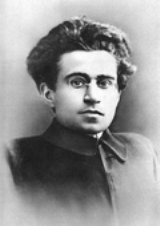
writer, politician
, political philosopher, and linguist
. He was a founding member and onetime leader of the Communist Party of Italy
and was imprisoned by Benito Mussolini
's Fascist regime. Gramsci was one of the most important Marxist thinkers in the 20th century, and his writings are heavily concerned with the analysis of culture and political leadership; he is notable as a highly original thinker within modern European thought.
I’m a pessimist because of intelligence, but an optimist because of will.![]()
All men are intellectuals: but not all men have in society the function of intellectuals.![]()
The crisis consists precisely in the fact that the old is dying and the new cannot be born; in this interregnum a great variety of morbid symptoms appear. ![]()
Economy and ideology. The claim (presented as an essential postulate of historical materialism) that every fluctuation of politics and ideology can be presented and expounded as an immediate expression of the structure, must be contested in theory as primitive infantilism, and combated in practice with the authentic testimony of Marx, the author of concrete political and historical works.![]()
History is at once freedom and necessity.![]()
Revolutionaries see history as a creation of their own spirit, as being made up of a continuous series of violent tugs at the other forces of society - both active and passive, and they prepare the maximum of favourable conditions for the definitive tug (revolution).![]()

